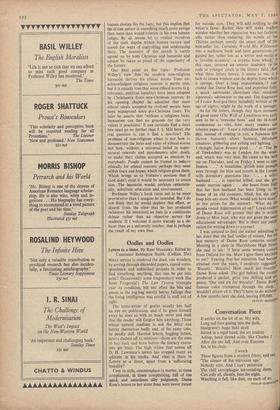Oodles and Oodles Letters to a Sister. By Rose Macaulay.
Edited by Constance Babington Smith. (Collins, 25s.) WHAT service is rendered the dead, one wonders, by sorting through discarded papers, casual corre- spondence and unfinished projects in order to find something, anything, that can be put into print? Occasionally some fragmentary work like Scott Fitzgerald's The Last Tycoon triumphs over its condition, but too often the bits and pieces in the rag-bag merely betray failings that the living intelligence was careful to stuff out of sight.
The letter-writer of genius usually has half an eye on publication, and if he gives himself away he does so with so much verve and dash that the reader will forgive him anything. Those whose natural medium is not the letter can betray themselves badly and, at the same time, be deadly dull. Hurried letters, begging letters, letters dashed off to relatives—those are the ones to buy back and burn before the literary execu- tors get busy. The high whine that comes off D. H. Lawrence's letters has stopped many an admirer in his tracks. And what is there in Letters to a Sister, apart from a suffocating banality?
Cosy in style, commonplace in matter, at times complaisant, at times complaining, full of too quick and sometimes silly judgments, Dame Rose's letters to her sister Jean were never meant for outside eyes. They will add nothing to the writer's fame. Rather they will make readers wonder whether her reputation was not fashion- able rather than enduring, the novels of the Thirties perhaps merely the smart stuff of the best-seller list. Certainly World My Wilderness . was a mediocre book and later generations re- garded her rather less as a writer and more as a 'lovable eccentric'—a cryptic term which, in this case, covered an unwise tendency to be rude to younger rivals in the literary field. .A:nd what these letters betray, it seems to me, is a lack of innate wisdom and the depths from which it springs. Over a long acquaintance, I con- cluded that Dame Rose had, and exploited fully, a quick adolescent cleverness that remained vigorously adolescent 'to the end. The fragments of Venice Besieged (here included), written at the age of eighty, might be the work of a teenager.
As for the letters, though they have moments of good sense (The Well of Loneliness was carlY seen to be a 'tiresome book' and the H-bornb condemned as vile), how many readers can tolerate pages of: 'I saw a ridiculous film yester• day, instead of coming to you, a Japanese film (Seven Samurai) about Samurai, detestable creatures, gibbering and yelling and fighting. . • I thought Sailor Beware good . . or 'The BP of Tewkesbury was in London for the week• end, which was very nice. He came to tea with me on Thursday, and on Friday I went to con' fession. . . .' A breathless, girlish note prevails even through the blitz and travels in the Levant, with dormitory questions like: . . a wife's husband . . . is reported killed, and she pre• sently marries again . . . she hears from Half that her first husband has been living in the house of an old countess, blind, but she can't keep him any more. What would you have done?' or (no prizes for the answer): 'What do the people round Aldermaston sit on?' Loyal readers of Dame Rose will protest that she is writing down to Miss Jean, who was not given the sans° educational advantages. But is there any justig' cation for writing down to anyone?
I was amused to find the author admitting to her sister that she had 'oodles of money,' for nsf last memory of Dame Rose concerns money' Meeting in a shop in Marylebone High Street' she said to me: 'I have some women coming from Oxford for tea. Must I give them anything to eat?' Fearing that her resources had become strained over the years, I modestly suggested: `Biscuits.' How much are biscuits?' Dame Rose asked. The girl behind the counter produced a packet, price one shilling and ail!' pence. 'One and six for biscuits!' Dame Rose,s famous voice trumpeted through the shop, wouldn't dream of it. They'll have to do without: A few months later she died, leaving £90,000. OLIVIA MANN'S°














































 Previous page
Previous page